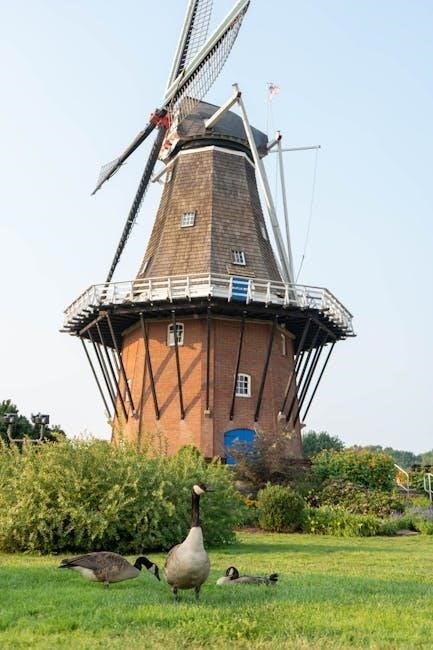
michigan fireworks law 2024 pdf
The Michigan Fireworks Safety Act, effective January 1, 2012, regulates the sale, use, and possession of consumer-grade fireworks. It allows fireworks on specific holidays, such as the 4th of July and New Year’s Eve, with designated timeframes for ignition. Violations can result in fines up to $1,000, emphasizing the importance of compliance to ensure public safety and environmental protection.
Overview of the Michigan Fireworks Safety Act
The Michigan Fireworks Safety Act, enacted in 2011 and effective January 1, 2012, governs the sale, possession, and use of consumer-grade fireworks in Michigan. It allows individuals to use fireworks on specific holidays, such as Independence Day and New Year’s Eve, within designated timeframes. The law aims to balance public safety with the tradition of celebrating special occasions. Penalties for non-compliance are enforced to ensure adherence to the regulations, protecting both individuals and communities from potential hazards.
Key Changes in the 2024 Fireworks Law
The 2024 Michigan Fireworks Law introduces stricter regulations on aerial fireworks, such as Roman candles and bottle rockets, which are now prohibited in state parks, trails, and harbors. Additionally, local municipalities have been granted more authority to enforce ordinances, allowing cities to impose stricter rules if deemed necessary. The law also extends permitted fireworks periods to include weekends before Memorial Day and Labor Day, ensuring longer celebration windows while maintaining safety measures and environmental protections.
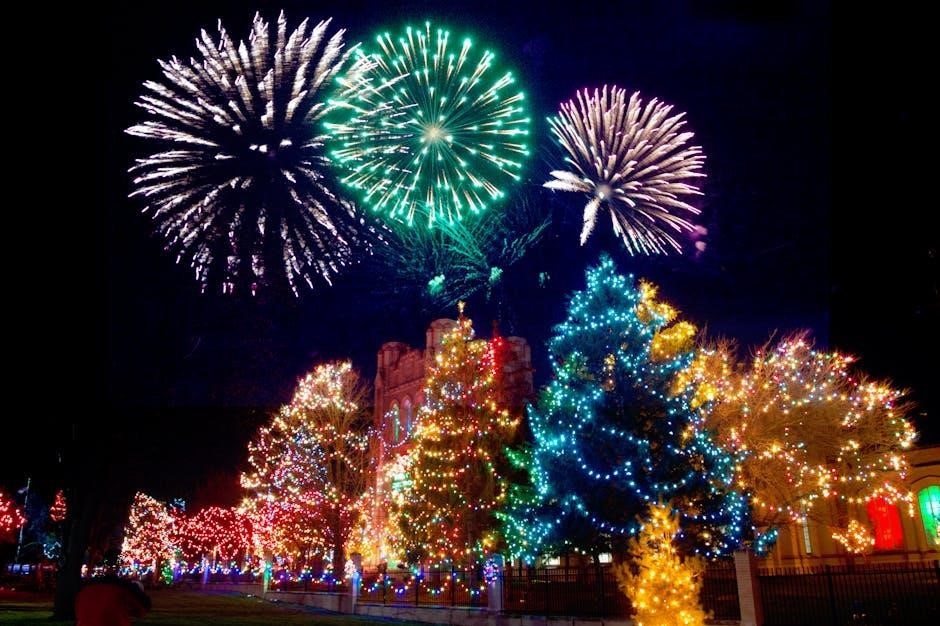
Permitted Fireworks and Their Classification
Michigan law permits consumer-grade fireworks, including sparklers, smoke bombs, and novelties, under the Michigan Fireworks Safety Act, while classifying aerial fireworks as restricted items.
Consumer-Grade Fireworks Allowed in Michigan
Under the Michigan Fireworks Safety Act, consumer-grade fireworks like sparklers, fountains, and smoke bombs are permitted for personal use. These items are classified as low-hazard and are allowed during designated holidays, such as July 4th and New Year’s Eve, within specific time frames. The law ensures public safety by restricting high-hazard fireworks, like aerial devices, to professional displays. Proper handling and adherence to local ordinances are essential to avoid legal consequences and ensure safe celebrations.
Prohibited Fireworks Under Michigan Law
Michigan law prohibits certain high-hazard fireworks, including aerial devices like Roman candles and bottle rockets, except for licensed professional displays. Fireworks are also banned on public properties, such as schools, churches, and state parks, to minimize risks. The use of fireworks in these prohibited areas or types can lead to legal consequences, emphasizing the need to adhere to state regulations for safe and compliant celebrations.
Legal Timeframes for Fireworks Use
Fireworks use in Michigan is permitted on specific holidays, such as the 4th of July and New Year’s Eve, with designated ignition timeframes to ensure public safety.
Designated Holidays for Fireworks Use
Michigan law permits consumer-grade fireworks on specific holidays, including the 4th of July, New Year’s Eve, Memorial Day weekend, and Labor Day weekend. Fireworks can be used from 11 a.m. to 11:45 p.m. on these days. However, local ordinances may impose stricter timeframes or additional restrictions. It is essential to check both state and local regulations before using fireworks to avoid legal consequences. Violations can result in fines, emphasizing the importance of adhering to designated holidays and timeframes.
Specific Time Windows for Fireworks Ignition
Michigan law allows fireworks to be ignited during specific time windows on designated holidays. Fireworks can generally be used from 11 a.m. to 11:45 p.m. on holidays like the 4th of July, New Year’s Eve, Memorial Day weekend, and Labor Day weekend. However, local ordinances may impose stricter timeframes, such as ending at 10 p.m. or 11 p.m. It is crucial to adhere to these time windows to avoid fines and ensure compliance with both state and local regulations.
Penalties for Violating Fireworks Laws
Violating Michigan’s fireworks laws can result in fines up to $1,000 per infraction. Legal consequences may also include court action and liability for damages caused by misuse.
Fines and Legal Consequences for Non-Compliance
In Michigan, violating fireworks laws can lead to fines of up to $1,000 per violation. Additional legal consequences may include court appearances and potential liability for damages. Non-compliance can result in legal action, emphasizing the importance of adhering to state regulations. Proper understanding and observance of these laws are crucial to avoid penalties and ensure public safety. Legal consequences may also extend to civil liability for any harm caused by improper fireworks use.
Civil Liability for Damages Caused by Fireworks
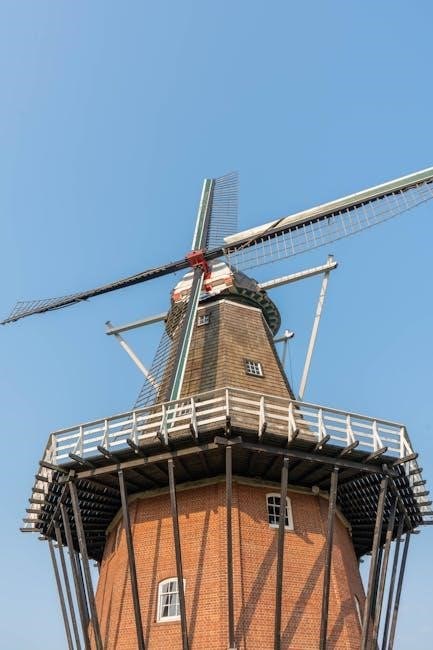
Under Michigan law, individuals may face civil liability for damages caused by fireworks. This includes property damage, personal injuries, or other harm resulting from improper use. Legal action can be taken against those responsible, potentially leading to lawsuits and compensation claims. Civil liability emphasizes the importance of responsible fireworks use to avoid legal consequences and financial repercussions for negligence or reckless behavior. Proper adherence to safety guidelines is essential to minimize such risks and ensure accountability.
Fireworks Safety Tips and Regulations
Always handle fireworks safely, ensure adult supervision, and keep water nearby. Follow local regulations and use only legal, consumer-grade fireworks to minimize risks and ensure compliance.
Best Practices for Safe Fireworks Handling
Always prioritize safety when handling fireworks. Ensure adult supervision for all activities and read instructions carefully before use. Light fireworks on flat, stable surfaces away from flammable materials. Keep water or a fire extinguisher nearby. Never relight duds or handle malfunctioning fireworks. Store fireworks in cool, dry places and dispose of used ones properly. Avoid using fireworks near pets or in windy conditions. Follow all local regulations and manufacturer guidelines to minimize risks and ensure a safe experience.
Emergency Procedures and Fire Prevention
In case of emergencies, keep a fire extinguisher or water source nearby. Never relight malfunctioning fireworks; instead, wait and soak them in water. Clear the area of leaves and debris to prevent fires. Ensure a phone is accessible to call emergency services if needed. Following these steps can help prevent accidents and ensure compliance with Michigan’s fireworks regulations, avoiding potential penalties.
Environmental and Health Impact
Fireworks emit pollutants, harming air quality and wildlife. Chemical exposure affects bone and tooth development in children and damages lung tissue, highlighting the need for safety guidelines.
Effect of Fireworks on Air Quality and Wildlife
Fireworks release pollutants like particulate matter, sulfur dioxide, and heavy metals, degrading air quality and posing risks to human health and wildlife. These emissions can linger in the atmosphere, contributing to long-term environmental damage.
Wildlife, especially aquatic species, suffer from water contamination due to firework residues. The noise and light from fireworks also disrupt natural habitats, causing stress to animals and potential behavioral changes.
Health Risks Associated with Fireworks Use
Fireworks release harmful chemicals, including heavy metals and particulate matter, which can exacerbate respiratory conditions like asthma. Prolonged exposure to these pollutants can lead to lung damage and other health issues.
The loud noises and bright lights from fireworks can also cause stress-related health problems. Additionally, improper handling of fireworks increases the risk of burns, eye injuries, and other physical harm, particularly among children and the elderly.
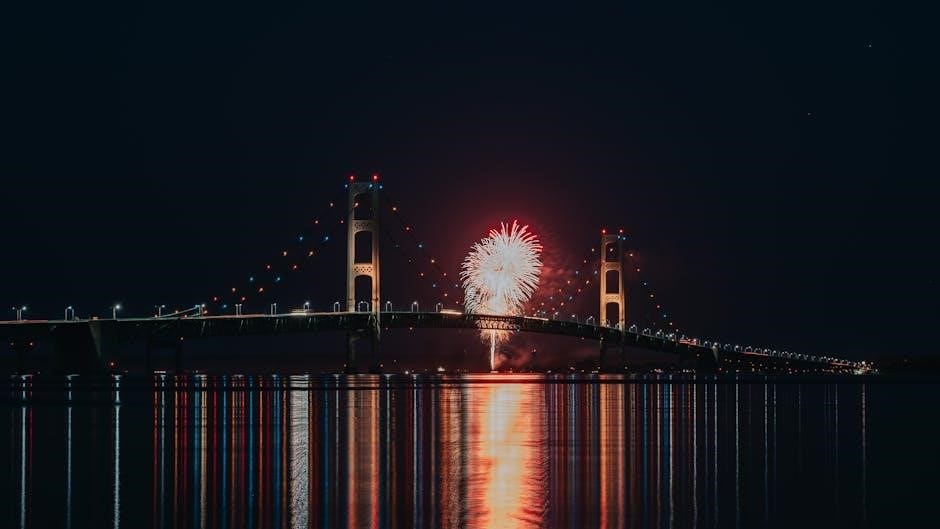
Local Ordinances and Municipal Regulations
Municipalities in Michigan often impose stricter fireworks rules than state law, such as banning fireworks on public property or near sensitive areas. Cities like Lansing enforce local ordinances with fines up to $1,000 for violations, ensuring community safety and addressing local concerns.
Differences in Fireworks Laws Across Michigan Counties
Fireworks laws vary significantly across Michigan counties, reflecting local concerns and safety priorities. Some counties, like Lansing, enforce strict ordinances with fines up to $1,000 for violations, while others align closely with state regulations. Charlevoix County, for example, regulates consumer fireworks use in townships under Public Act 256 of 2011. These differences highlight the importance of checking local ordinances before using fireworks to ensure compliance and avoid penalties.
City-Specific Fireworks Ordinances and Restrictions
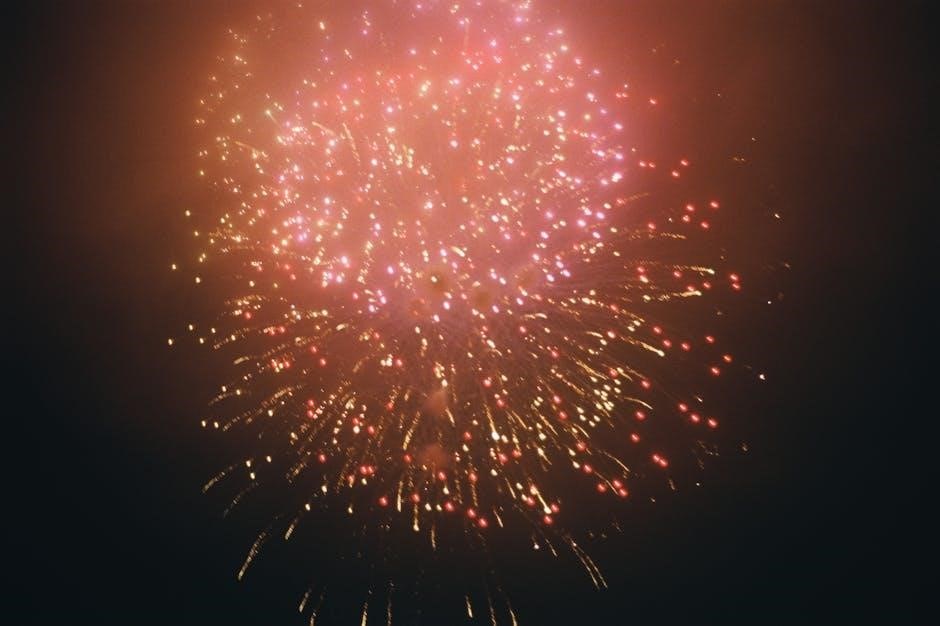
Michigan cities impose additional fireworks restrictions beyond state law. Lansing prohibits fireworks on public property, including schools and churches, with violations penalized up to $1,000. Munising enforces specific time windows for fireworks use during celebrations. Charlevoix Township regulates consumer fireworks under Public Act 256, ensuring safety and noise control. These city-specific rules highlight the need for residents and visitors to familiarize themselves with local ordinances to avoid legal consequences and ensure community safety during festive events.

Fireworks and Public Safety
Fireworks pose risks to public safety, with incidents reported during celebrations. Law enforcement plays a crucial role in regulating their use to minimize injuries and property damage.
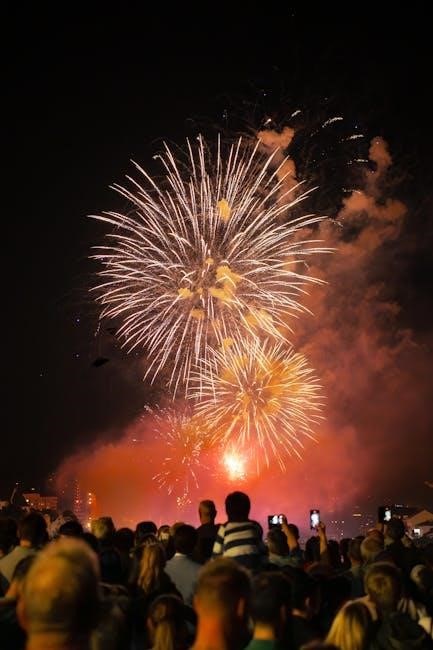
Role of Law Enforcement in Fireworks Regulation
Law enforcement plays a critical role in enforcing Michigan’s fireworks regulations, ensuring public safety and compliance with state laws. Officers monitor fireworks use during permitted periods, issue fines for violations, and respond to incidents involving prohibited fireworks. They also collaborate with local authorities to address illegal sales and improper use, particularly during peak holiday seasons like Independence Day and New Year’s Eve, to minimize risks and protect communities from potential hazards.
Fireworks-Related Injuries and Incident Reporting
Fireworks-related injuries, often involving burns or eye damage, are a significant concern in Michigan. According to reports, incidents frequently occur during holidays like Independence Day. Victims or witnesses must report such cases to local authorities or hospitals. Proper documentation ensures legal action against negligence and aids in preventing future accidents. Improper fireworks use can lead to fines and civil liability, emphasizing the importance of responsible handling and timely reporting to maintain public safety and accountability.

Fireworks Displays and Public Events
Michigan hosts numerous public fireworks displays, such as the Munising Fourth of July celebration and Walled Lake shows, which require permits under the Fireworks Safety Act.
Permits Required for Public Fireworks Displays
Public fireworks displays in Michigan require permits under the Fireworks Safety Act. Events like the Munising Fourth of July celebration and Walled Lake shows must obtain approval. Aerial fireworks, such as Roman candles, are banned in state parks and harbors. Permits ensure compliance with safety standards, insurance requirements, and local ordinances. The Bureau of Fire Services oversees the process, ensuring all displays meet legal and safety regulations to protect participants and spectators. Proper documentation and inspections are mandatory before approval.
Notable Fireworks Events in Michigan for 2024
Munising’s Fourth of July celebration and the Walled Lake fireworks show are highlights of Michigan’s 2024 events. Both feature spectacular displays, attracting large crowds. Munising’s event includes fireworks over Lake Superior, while Walled Lake’s show is launched from a barge. These events comply with state laws, ensuring safety and entertainment. They reflect Michigan’s vibrant culture and community spirit, celebrating independence and togetherness through dazzling fireworks.
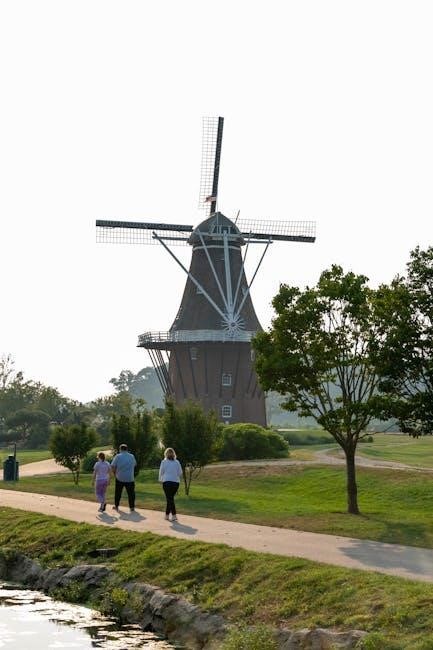
Fireworks Law Enforcement and Compliance
Law enforcement actively monitors fireworks use, imposing fines up to $1,000 for violations. Reporting illegal activities helps maintain safety and compliance with state regulations.
How to Report Fireworks Violations
To report fireworks violations in Michigan, contact local law enforcement or call the non-emergency number. Provide details like location, time, and type of violation. Online reporting forms may also be available through municipal websites. Reports help authorities enforce regulations, ensuring public safety and reducing risks associated with illegal fireworks use. Timely reporting is crucial for addressing violations effectively and maintaining community compliance with state laws.
State and Local Efforts to Enforce Fireworks Laws
Michigan state and local authorities collaborate to enforce fireworks regulations through education and enforcement. The Bureau of Fire Services oversees compliance with the Fireworks Safety Act, while local law enforcement agencies monitor illegal use. Public awareness campaigns highlight legal timeframes and prohibited areas. Municipalities may adopt stricter ordinances, and violations are addressed through fines and penalties. This coordinated approach aims to protect public safety and reduce fireworks-related incidents across the state.
Adhering to Michigan’s fireworks laws is crucial for public safety and environmental protection. Responsible use ensures enjoyable celebrations while preventing legal consequences and potential hazards.
Importance of Adhering to Fireworks Laws
Adhering to Michigan’s fireworks laws is essential for maintaining public safety and environmental protection. Fireworks misuse can lead to injuries, property damage, and wildfires. Legal consequences, including fines up to $1,000, emphasize compliance. Following regulations ensures enjoyable celebrations while safeguarding communities. Responsible usage respects local ordinances, reduces disturbances, and promotes a safer environment for everyone.
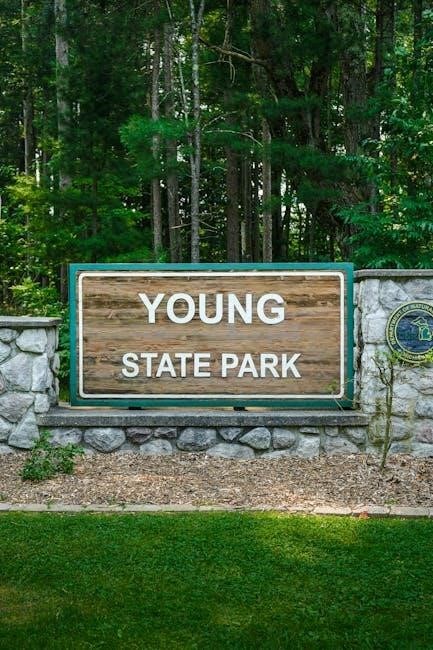
Future Outlook on Fireworks Regulation in Michigan
Michigan’s fireworks laws may see stricter regulations in the future, focusing on environmental impact and public health. As concerns about air quality and noise grow, policymakers could introduce more restrictive timeframes or bans on certain products. Enhanced enforcement of existing laws and increased public education on safe practices are likely. Counties may adopt stricter local ordinances, aligning with statewide efforts to balance tradition and safety. Public feedback will play a crucial role in shaping these updates to ensure responsible fireworks use.